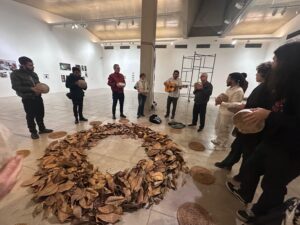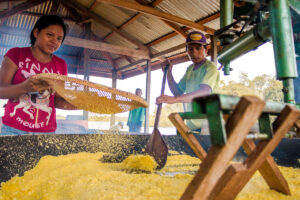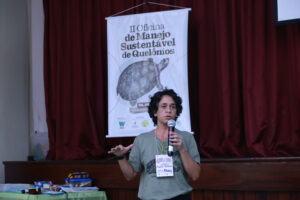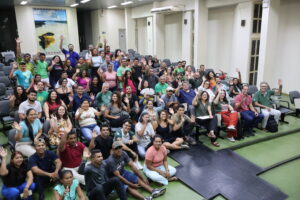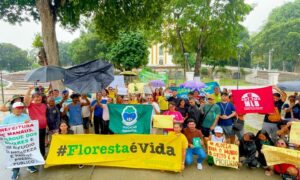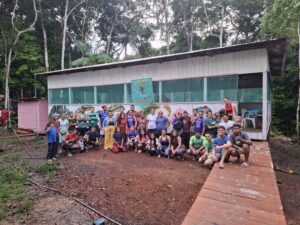Update to Normative Instruction No. 17 (MAPA/MMA) includes animal-based products and fulfills a long-standing demand from communities and civil society organizations
By: Talita Oliveira (Native Amazon Operation/OPAN and Pirarucu Collective)
After nearly ten years of mobilization by communities, collectives, and civil society organizations, sustainably managed pirarucu may finally be recognized as a product eligible for organic certification. The updated wording of the regulation, which will be formalized through an Interministerial Ordinance, sets the criteria for certifying products from sustainable extractivism and was presented during a public hearing held in May in Manaus, during the 13th Meeting of the Pirarucu Collective.
The new regulation — now overseen by the Ministries of Agriculture and Livestock (MAPA), Fisheries and Aquaculture (MPA), and the Environment and Climate Change (MMA) — marks a milestone by including animal-based products among those eligible for organic certification. The measure is considered a historic achievement for traditional peoples and extractivist communities in the Amazon.
“Every certification process brings differentiation and added value to the product, with positive impacts on the market and access to public policies. We are here to present the result of all these years of effort,” said Bruna De Vita, director of the Department of Policies to Promote the Bioeconomy at the MMA’s National Secretariat for Bioeconomy, during the public hearing, which brought together around 80 participants, including representatives from the ministries, the Maniva Agroecology Network of Amazonas (REMA), and the Pirarucu Collective.
Process began in 2015
Discussions on including pirarucu in the organic regulation began in 2015, through dialogues led by the Carauari Rural Producers Association (Asproc). In 2018, the issue gained momentum with the presentation of a motion by the Pirarucu Collective calling for the fish to be included in the organic regulation.
Since then, numerous efforts have been made to develop technical proposals, build political alliances, create a working group within the Organic Production Commission of Amazonas (CPOrg/AM), and maintain ongoing mobilization — even amid the pandemic and an unfavorable political climate until 2022. The expectation is that the new regulation will be finalized by 2025.
“It’s been 10 years of discussion and persistence to get this regulation off the ground. The market doesn’t solve everything; we must influence public policies. Our biggest challenge is to make products that promote conservation as profitable as those that drive destruction,” said Adevaldo Dias, president of the Chico Mendes Memorial (MCM) and member of the Collective.
This advocacy journey was documented in the article “Organic Certification as a Strategy to Strengthen the Sustainable Pirarucu Value Chain in Amazonas”, presented at the 12th Brazilian Agroecology Congress, held in Rio de Janeiro in 2023. The process also gained wider visibility through the documentary “Organic Pirarucu”, produced by the Mamirauá Sustainable Development Institute (IDSM) and released in 2024, featuring testimonials from representatives of the involved organizations.
Certification with Amazonian DNA
With the new regulation in place, the next step will be the collective development of specific procedures and methods for certifying managed pirarucu, based on the Participatory Guarantee System (SPG) for organic certification. The process will involve REMA, the Maniva Participatory Conformity Assessment Body (OPAC), CPOrg/AM, MAPA, and the Pirarucu Collective.
“As an OPAC, we will move forward into the animal production scope and contribute to this effort, which is already being developed in the territories,” said Ramon Morato, coordinator of CPOrg/AM. He also emphasized the Amazon’s leadership in the process and the importance of expanding access to organic products.
“We have something with Amazonian DNA that can contribute to national legislation. Our effort, as part of the agroecological movement, is aimed at popularizing organic certification so that these products can truly be accessible to the population,” he added.

